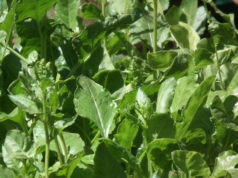
BILL BANS MICROPLASTICS IN PERSONAL-CARE PRODUCTS
Gov. John Hickenlooper signed a bill last week by Rep. Dianne Primavera (D-Broomfield) banning the plastic microbeads often included in soaps and cosmetic products. The bill requires the sale and manufacture of products containing microbeads to be phased out by January 2020.
Microbeads, commonly used in face scrubs, acne treatments and toothpaste, are too fine to be caught in wastewater treatment plants and don’t decompose quickly. Often ending up in lakes and rivers, they pose a threat to water ecosystems. Small fish often mistake the beads for eggs, and die shortly after or poison the larger fish that prey on them — pushing the toxins further up the food chain toward human consumption.
While the microbeads themselves are not toxic, they can absorb and store other toxins.
“They are about the same size as fish eggs, which means that, essentially, they look like food,” Sherri Mason, an associate professor of chemistry at the State University of New York, Fredonia, said to NPR. “So our concern is that, essentially, they are making their way into the food web.”
Other states, including New York and Illinois, have taken steps toward banning the tiny particles of plastic. Researchers from the 5 Gyres Institute, who have spent several years studying the microplastics now banned in Colorado, tested a tube of the Johnson & Johnson facial scrub Clean & Clear, finding that a single tube contained 330,000 microbeads.
With many large personal-care product manufacturers already replacing microbeads with biodegradable exfoliators, it’s clear that the despite their micro size, the beads are causing macro problems.
—Steven Grossman
GENETICALLY ENGINEERED FRUITS AND VEGETABLES MAY POSE HEALTH RISKS
In a statement released by the U.S. Food and Drug Administration (FDA), genetically engineered (GE) varieties of apples and potatoes are green lit for sale commercially. The FDA ruled that two varieties of GE apples produced by Okanagan Specialty Fruits, Inc. and six types of the J.R. Simplot Company’s GE potatoes were “as safe and nutritious as their conventional counterparts,” according to the FDA’s press release.
Okanagan’s Granny Smith and Golden Delicious varieties of apples, collectively called “Arctic Apples,” are genetically engineered to resist browning by reducing the levels of enzymes that cause browning. Despite the FDA’s approval, many institutions have expressed concerns that the new form of genetic engineering, called RNA interference (RNAi), has not been sufficiently studied and may have other adverse effects.
“This decision is scientifically irresponsible and misguided,” Doug Gurian-Sherman, senior scientist at the Center for Food Safety (CFS), said in a press release. “USDA should hold off on deregulating RNAi-engineered crops until they have gotten a grip on the latest research in this area.”
One of the CFS’s major concerns with the Artic Apple, is that browning is often a sign that an apple is no longer fresh, and masking natural signifiers puts consumers at an increased risk of unknowingly ingesting pathogens. With pre-sliced apples often used in juice, baby foods and applesauce, children are put at increased risk for any adverse health effects potentially associated with the new varieties.
—Steven Grossman














